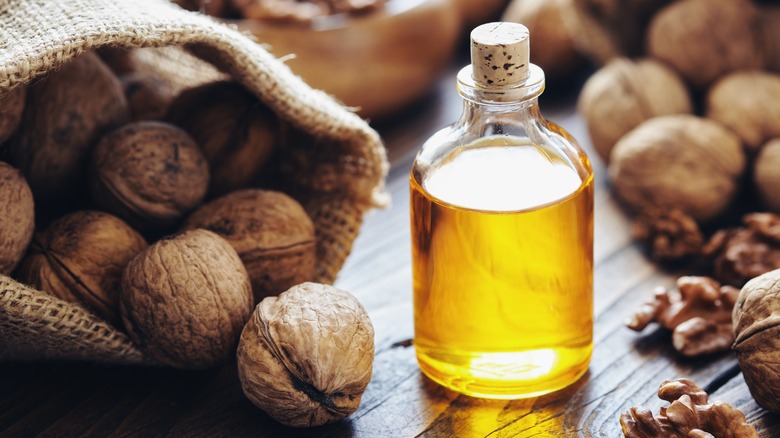The Reason You Should Always Have Walnut Oil In Your Pantry
It may seem like a specialty item, but walnut oil can be an incredibly versatile part of your pantry — and not just if you love making Georgian bazhe sauce. As a finishing oil, it imparts a warm, nutty flavor to aged cheese, chilled pasta, salads, baked goods, and vegetable dishes. Beyond that, it appears to offer several valuable health benefits.
Walnut oil is produced in a variety of ways. Unrefined walnut oil is cold-pressed from walnut paste and is therefore the least bitter and most expensive. The refined version is expeller-pressed (or extracted with a solvent) and often used for baking. Beyond that, you get a combination of the first two processes, blended oils, or neutral oils infused with walnuts. Regardless of how its made, walnut oil has a low smoke point and tends to get bitter when heated, so it's not recommended as a cooking oil for anything more than low-heat sautéing.
How to cook with walnut oil
One way to initially approach using walnut oil is as a substitute for olive oil. It makes a marvelous vinaigrette and can be simply drizzled over a Mediterranean chickpea salad or incorporated into a kale pesto. Because of its gentle, sweet, and slightly astringent taste, walnut oil is perfectly suited for salads and other uncooked dishes.
It can also be drizzled over steamed fish, cooked fruit, baked root vegetables, fresh bread, or aged cheese. Use it for your next batch of banana bread or chicken salad, or toss with freshly-cooked pasta noodles. Once opened, a container of walnut oil keeps well for up to six months if stored in a cool, dark place in your cupboard.
There is another kind of walnut oil that is not produced for internal consumption but is food-safe. It's used to polish and protect wooden bowls, cutting boards, and utensils. Traditionally used by the French for this purpose, walnut polishing oil has a sweet scent, resists water, and will not impart an aftertaste.
Nutritional information about walnut oil
One tablespoon of walnut oil contains about 120 calories and 14 grams of fat and is a good source of phosphorus, zinc, vitamins E and K, and the antioxidant selenium, per WebMD. Antioxidants have been shown to help control blood sugar levels. In fact, one study showed that people with type 2 diabetes who consumed 1 tablespoon of walnut oil every day for three months significantly improved their glucose levels (via NIH).
According to Healthline, 1 tablespoon of walnut oil also contains more than five times the recommended daily dose of the omega-3 ALA, or alpha-linolenic acid. Unsaturated fatty acids like omega-3s can be good for many things, including boosting skin health, reducing inflammation, and lowering blood pressure and cholesterol. Finally, there's promising data on walnut oil having anticancer effects because it contains ellagitannins, which our bodies convert into a compound called urolithins that may help lower the risk of disease.
Where to buy walnut oil
With all this in mind, it might just be worth a little splurge to add walnut oil to your pantry essentials. Luckily, there are many online options. For the gourmet budget, the venerable French producer Huilerie Lablanc sells a pure, cold-pressed oil, per Simply Gourmand. La Tourangelle's roasted walnut oil is a highly-rated California product. And, of course, Amazon has an entire range of types and prices. For the non-edible but food-safe wood finishing version of walnut oil, look to the folks at Lee Valley.
At your local grocery store, look in the cooking oil section — most large chains like Kroger carry even the pricier versions of walnut oil. Finally, there's the traditional method used in Georgian cuisine in the Caucasus: Roast and grind your own walnuts, then release the oil by laboriously pressing them with the back of a spoon. What this process might lack in efficiency it should more than make up for in artisanal satisfaction.



